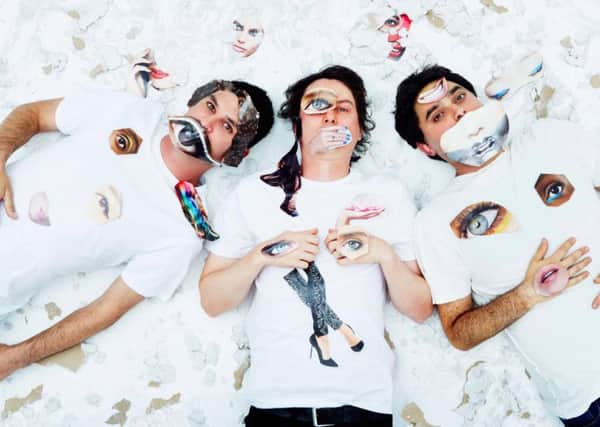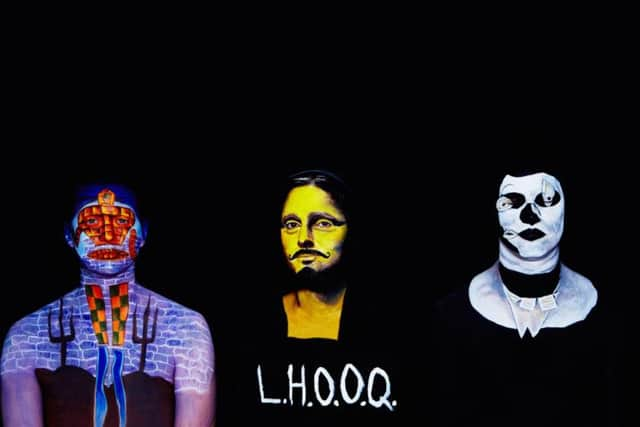Music interview: Animal Collective


Animal Collective’s 11th album is something of a first for the American experimental pop band.
“We talked about how we had never done a record of short songs,” says Brian Weitz, aka Geologist, on the starting point for Painting With. “Short, punchy, uptempo things – and that came out of some of the records we were talking about as friends like the first Ramones record or the early Beatles records.
Advertisement
Hide AdAdvertisement
Hide Ad“We felt that a lot of our records had pieces that we knew how things fit together – there’s going to be ambient sections and the songwriting would be stream of consciousness – and we thought that it’s just not our style to do a record where the songs are two or three minutes and they’re really uptempo the whole time and it seemed very challenging to us, and our aesthetic and what we like about music, to fit into music that was something so different for us.”


References to art movements such as Dada and Cubism came after the music, says Weitz. “Something like Dadism is often referenced in Animal Collective because some of us are really interested in experimental music and musique concrete, there’s connections there between John Cage and Duchamp.
“We’ve spoken about the connections between that movement to music for a long time and Dave [Portner, aka Avey Tare] and I are both very into musique concrete and we’ve tried to put collage elements in our music on most of the records. We felt like we’ve always done it a little bit more in an ambient way or more psychedelic, and not ever in the pure sense of Dadaism, ripping things from other places and culture and pasting it where the edges are very rough.
“I suppose that may be one area where we talked about it before any writing happened, ‘let’s approach collage a little bit differently, where the edges are more jagged’, but after that when we were having a writing session and speaking with one another, a lot of the references we would say to one another there was ‘Maybe a little brush stroke of sound there’, ‘The song is seeming very red right now, maybe we could use some other colours in it’ and we realised we were talking to each other, as we often do, with a visual reference.
Advertisement
Hide AdAdvertisement
Hide Ad“We were talking about looking at a pop song from a Cubist perspective – not just look at the melody and the chorus and the hook but think about the textures as well, like a skewed perspective on it.”


Unusually for Animal Collective, Weitz, Portner and Noah Lennox, aka Panda Bear, wrote and recorded the songs first, rather than testing them out live. “I don’t know if it was easier or more difficult, it was just different,” says Weitz. “One thing that was easier was letting go of certain parts that weren’t really doing service to the song.
“When you play the songs live first, especially when you go on multiple tours with them, you come up with these parts that you play every night and you get very attached to them and you can be somewhat sentimental about them and precious. Sometimes when you’re in the studio after that process you think ‘This song’s a little cluttered, maybe we should take some stuff away, and speaking for myself I’d be like ‘You’re not taking that away because that’s my part, I’ve lived with that part now for six months and that’s how I relate to the song, it’s fixed in my head’ and I think that can be a drawback sometimes.
“So not touring the material first and just going into the studio with a part that I came up with only one or two months prior and I’d only played it in rehearsal if it wasn’t working it was not difficult for me to say ‘Let’s scrap that, I’ll just go in the room and try something else or just scrap it and maybe it doesn’t need anything else there’ and I had no sentimentality about that kind of thing.”
Advertisement
Hide AdAdvertisement
Hide AdWhat remains with Animal Collective is a strong sense of playfulness. “Serious is a strange word,” says Weitz, considering how the trio approach their work. “I don’t know if ‘serious’ is a binary word – you’re either serious or not serious.
“We work very hard at what we do and we take that very seriously. Especially earlier in our career – 2004, 2003 – I think some people thought we were almost making a joke or being ironic and we’ve never felt ironic about anything we do or never tried to convey irony. We are very sincere in what we do. We value our friendship with each other first and foremost. Music is supposed to be fun and it means so much to us that if it’s not fun we’re not going to do it.
“We don’t sit around thinking we have to make a record that’s going to be well received and sell a lot of copies so that we can pay our bills, that’s not going to be the primary driver. The driver is going to go in and have fun and it should be a playful experience, but we work really hard. I don’t know about serious but I would say we are very sincere in what we do.”
Animal Collective play at Leeds University Stylus on September 7. For more on the band CLICK HERE